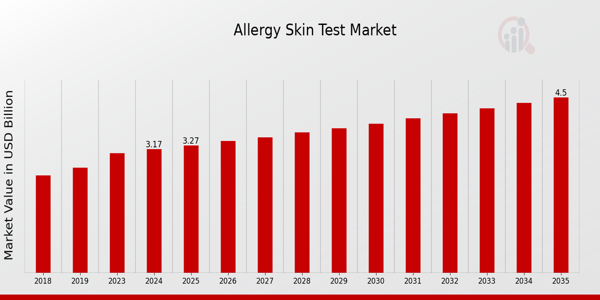Allergy Skin Test Market: Trends, Growth, and Future Outlook

The allergy skin test market is experiencing steady growth, driven by rising allergy cases globally and growing awareness about early diagnosis and treatment. Skin testing remains a critical diagnostic tool in identifying specific allergens responsible for reactions such as hay fever, asthma, eczema, and food allergies. As lifestyles evolve and environmental factors shift, the demand for allergy diagnostics, particularly skin tests, is seeing a noticeable uptick.
Rising Prevalence of Allergic Conditions
Allergies have become one of the most common chronic conditions worldwide. Urbanization, pollution, dietary changes, and lifestyle habits have contributed to the increasing incidence of allergies in both children and adults. Skin prick tests (SPT) and intradermal tests have become the preferred methods for allergy detection due to their accuracy, quick results, and cost-effectiveness. These tests allow clinicians to determine sensitivities to substances like pollen, mold, dust mites, pet dander, and specific foods, making them a vital tool in personalized allergy management.
Technological Advancements and Innovation
Modern allergy skin test methods are evolving with digital enhancements and automation. While traditional methods like scratch or patch tests still hold value, newer systems are being developed with improved accuracy and minimal patient discomfort. Manufacturers are focusing on creating compact, portable devices for clinics and hospitals that streamline the allergy testing process and reduce human error.
AI-assisted diagnostics and data interpretation are also entering the market, enabling clinicians to combine patient history with test results for better diagnostic accuracy. This integration is improving clinical decision-making and helping identify complex allergy profiles with more precision.
Market Growth Drivers
Several factors are fueling market growth:
Rising healthcare awareness: Consumers are more health-conscious and proactive about identifying potential allergens.
Rising Prevalence of Allergic Conditions
Allergies have become one of the most common chronic conditions worldwide. Urbanization, pollution, dietary changes, and lifestyle habits have contributed to the increasing incidence of allergies in both children and adults. Skin prick tests (SPT) and intradermal tests have become the preferred methods for allergy detection due to their accuracy, quick results, and cost-effectiveness. These tests allow clinicians to determine sensitivities to substances like pollen, mold, dust mites, pet dander, and specific foods, making them a vital tool in personalized allergy management.
Technological Advancements and Innovation
Modern allergy skin test methods are evolving with digital enhancements and automation. While traditional methods like scratch or patch tests still hold value, newer systems are being developed with improved accuracy and minimal patient discomfort. Manufacturers are focusing on creating compact, portable devices for clinics and hospitals that streamline the allergy testing process and reduce human error.
AI-assisted diagnostics and data interpretation are also entering the market, enabling clinicians to combine patient history with test results for better diagnostic accuracy. This integration is improving clinical decision-making and helping identify complex allergy profiles with more precision.
Market Growth Drivers
Several factors are fueling market growth:
Rising healthcare awareness: Consumers are more health-conscious and proactive about identifying potential allergens.